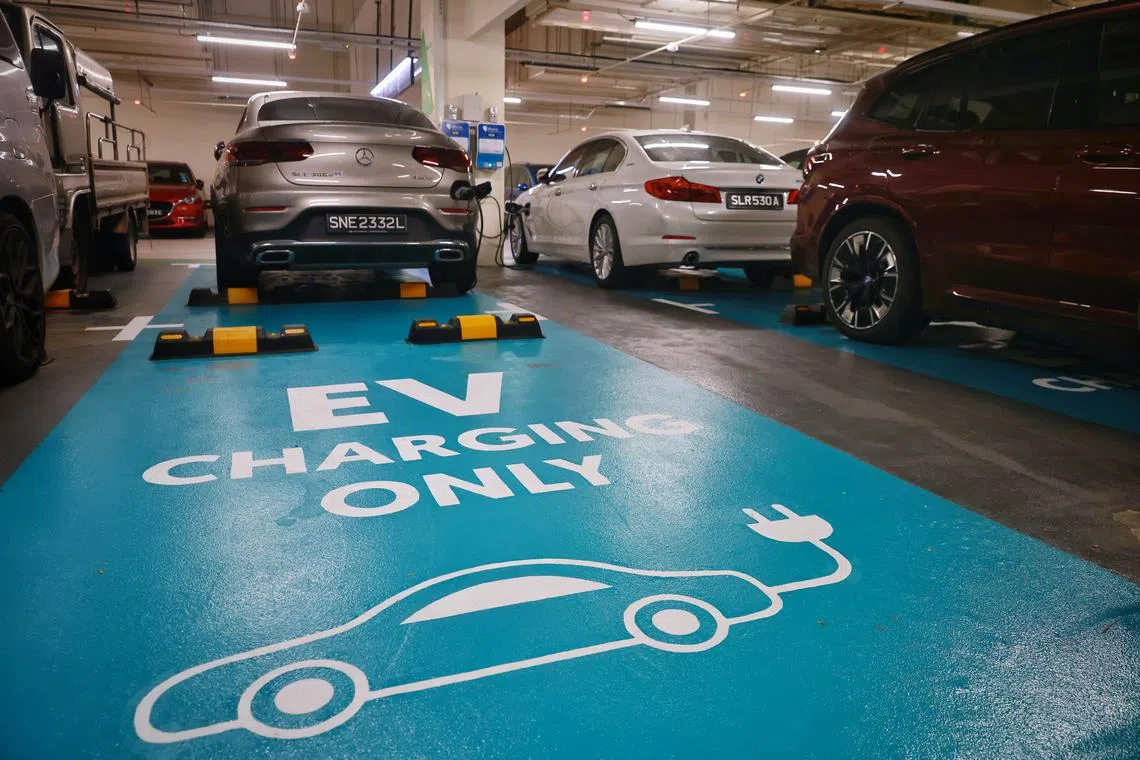NUHS public hospitals roll out EV charging; electric ambulances, solar roof panels in the pipeline
Sign up now: Get ST's newsletters delivered to your inbox

Electric vehicle chargers installed at Ng Teng Fong General Hospital.
ST PHOTO: JASON QUAH
Follow topic:
SINGAPORE – The National University Health System (NUHS) is plugging into Singapore’s electrification drive by installing 22 electric vehicle (EV) charging stations across three of its hospitals and replacing ageing fuel-run ambulances and vans with electric ones at two hospitals.
NUHS, which operates a group of hospitals and clinics in the western part of Singapore, will get the EV chargers from SP Group.
The National University Hospital will have three 7.4 kilowatt and 13 22kW chargers; Ng Teng Fong General Hospital will have two 7.4kW and two 22kW chargers; and Alexandra Hospital will have two 22kW chargers. The first 12 chargers are already up, with the rest to be ready by the end of the year.
Mr Ng Kian Swan, who chairs NUHS’ energy and water task force, said: “Hospitals are public facilities with footfall, and we can do our part to make accessible to the public EV charging stations, which also encourages our employees to consider zero-emissions electric vehicles.”
Eighty more charging stations will be built by 2028.
Mr Ng, who is also chief operating officer of Ng Teng Fong General Hospital, added that the hospital is buying three electric ambulances and one electric van this year for around $500,000.
He said this will “lower operating costs in the longer term”, as electricity is cheaper than fossil fuels.
The hospital has also just replaced its fleet of three diesel-powered general duty buggies with electric models.
And by 2024, Ng Teng Fong General Hospital, Alexandra Hospital and the National University Hospital will be the first public hospitals here to have solar panels.
The solar panels at the three facilities will generate approximately 860,000 kilowatt-hours of electricity per year, or 0.54 per cent of their annual power consumption.
NUHS said the solar panels will not involve any capital investment, as the installers will charge the hospitals for electricity generated by the panels. This is typically at a rate lower than electricity tariffs for several years.
Similarly, the EV chargers are paid for by SP Group, which earns when motorists plug into them.

Ng Teng Fong General Hospital will have two 7.4kW and two 22kW chargers.
ST PHOTO: JASON QUAH
“Hospitals are energy-intensive facilities, operating round the clock,” Mr Ng said, adding that the solar installation would cut carbon emissions by 350 tonnes per year. “The interdependence of healthcare and climate change provides NUHS with a unique opportunity to mitigate climate change and have a positive impact on people and the planet’s health.”
SP Group currently has 650 charging points across the island, and it expects this number to hit 1,000 by the end of 2023 – a figure it had initially expected to reach by 2020, before the Covid-19 pandemic delayed the roll-out.
SP Group head of mobility Dean Cher said: “Hospitals and medical facilities provide essential services for our population. Partnering NUHS to further its green ambitions will help to decarbonise the healthcare sector.”


